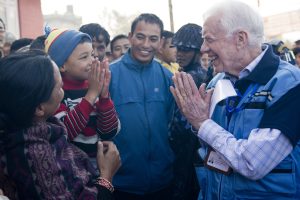The death of former U.S. President Jimmy Carter is being mourned far from his home in the Himalayan country of Nepal.
It has evoked memories of and gratitude for his role in the Nepali peace process, mainly in getting the Communist Party of Nepal (Maoist) to move away from their decade-long guerilla warfare to participate in mainstream politics, a rarity among Maoist movements worldwide. Carter was also the highest-ranking American figure to advocate for the de-listing of Nepal’s Maoists from the U.S.-designated terrorist list.
Carter came to Nepal in 2007, when he met Maoist leaders Pushpa Kamal Dahal aka “Prachanda” and Baburam Bhattarai for around an hour.
Following the meeting, Maoist chair Dahal told the media that while the Maoists want “friendly relations with the U.S.,” the “U.S. government has put us on its terrorist watch list.” He urged the U.S. to remove the Maoists from the terrorist list. The CPN-Maoist was included in the U.S. terrorist list in 2004.
In 2008, Carter expressed support for delisting Nepal’s Maoists from the terrorist list. “My hope is and my cautious expectation is that the U.S. will in the future recognize the authenticity and the non-terrorist nature of the commitment of the Maoists,” he told journalists in Kathmandu.
In a letter dated May 28, 2009, Dahal, as did leaders of other parties, formally invited Carter’s organization, The Carter Center, to participate in Nepal’s peace process. Appreciating Carter’s “continued interest in Nepal’s ongoing peace and constitution drafting process,” Dahal said he “would welcome further support from your side including a continued international observation presence at the local level to observe the constitution drafting and strengthen the implementation of the peace process.”
This marked a significant shift in the Maoists’ position. Hitherto, the Maoists had opposed any foreign role in Nepal’s internal affairs, describing it as “foreign interference.” American involvement was derided as “American imperialism.”
In 2009, Carter, as a philanthropic private citizen of the U.S. running his Carter Center, met Dahal, who once again urged for the delisting of the Maoists.
It took eight more years for the Maoists to be delisted from the U.S. terrorist list. On September 6, 2012 — six years after they entered Nepal’s mainstream politics after inking the Comprehensive Peace Agreement of November 21, 2006, the U.S. removed the Maoists from the terrorist list.
A U.S. government statement said: “The Department of State has revoked the designation of the Communist Party of Nepal (Maoist) and its aliases as a Specially Designated Global Terrorist entity under Executive Order 13224, and as a “terrorist organization” from the Terrorist Exclusion List (TEL) under the Immigration and Nationality Act (INA).”
Explaining its decision to delist the organization, the U.S. statement said that “…in recent years, the Maoist party has been elected as the head of Nepal’s coalition government, has taken steps to dismantle its apparatus for the conduct of terrorist operations, and has demonstrated a credible commitment to pursuing the peace and reconciliation process in Nepal.”
Thus ended the 8-year-long terrorist designation of Nepal’s Maoists.
Besides, his advocacy role in getting the Maoists delisted from the terrorist list, Carter had worked for peace and democratization in Nepal. The Carter Center started its operations in Nepal in 2004. Its observers began visiting Nepal in 2007, and Carter was in Nepal to take stock of the situation during two consecutive Constituent Assembly elections, in 2008 and 2013.
Carter praised the inclusivity of Nepal’s Constituent Assembly. In an article for The Kathmandu Post and Kantipur Daily of Nepal, Carter wrote, “The Constituent Assembly elected in 2008 and dissolved in May 2012 was also the most inclusive and representative governing legislature in Nepal’s history, with leaders chosen by all parties and with more women parliamentarians than any equivalent ruling body in South Asia.”
Carter’s work in Nepal has prompted several Nepali leaders to remember his contribution to the peace process. In his condolence message, Dahal described Carter as a steadfast friend of Nepal.
































